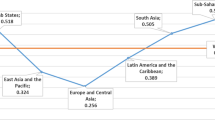Abstract
Rural families must constantly negotiate their livelihoods by obtaining access to natural resources, labor, capital, knowledge, and markets. Successful negotiation leads to enhanced family well-being and sustainable use of natural resources. Unsuccessful negotiation threatens family survival, threatens sustainable use of natural resources, and reduces bio-diversity. These negotiation processes are mediated by gender relations. The ideas of negotiation and of survival strategies outlined here provide a framework within which the articles of this issue can be situated. The articles are the result of research on gender and natural resource management conducted in Latin America, Asia, Africa, and North America. Each experience illustrates the consequences for natural resources and family well being when they have voice and when they do not have voice in household decisions.
Similar content being viewed by others
References
Agarwal, B. (1994). “Gender and command over property: A critical gap in economic analysis and policy in South Asia.” World Development 22(10): 1455-1478.
Bebbington, A. (1999). “Capitals and capabilities: A framework for analyzing peasant viability, rural livelihoods and poverty.” World Development 27(12): 2021-2044.
Blumberg, R. L. (1995). “Introduction: engendering wealth and well-being in an era of economic transformation.” In R. L. Blumberg, C. A. Rakowski, I. Tinker, and M. Monteón (eds.), EnGENDERing Wealth and Well-Being. Empowerment for Global Change (pp. 1-14). San Francisco: Westview Press.
Dunn, E., N. Kalaitzandonakes, and C. Valdivia. (1996). “Risk and the impacts of micro-enterprise services.” Assessing the Impacts of Microenterprise Services (AIMS). MSI. Washington DC.
Ellis, F. (1998). “Household strategies and rural livelihood diversification.” The Journal of Development Studies 35(1): 1-38.
Engle, P. (1995). “Father's money, mother's money, and parental commitment: Guatemala and Nicaragua.” In R. L. Blumberg, C. A. Rakowski, I. Tinker, and M. Monteón (eds.), EnGENDERing Wealth and Well-Being. Empowerment for Global Change, Chapter 8. San Francisco: Westview Press.
Ferguson, A. E. (1992). “Differences among women farmers: Implications for African agricultural research programs.” Proceedings of a Workshop on Social Science Research and the CRSP's June 9–11 (pp. 47-62). Lexington Kentucky. INTSORMIL Publication No. 93-3.
Koc, M. and K. Dahlberg (1999). “The restructuring of food systems: Trends, research and policy issues.” Agriculture and Human Values 16(2): 109-116.
Kusterer, K. (1989). “Small farmer attitudes and aspirations.” USAID Program Evaluation Discussion Paper No. 26. USAID, Washington, DC.
Moghadam, V. (1995). “Gender dynamics of restructuring in the semiperiphery.” In R. L. Blumberg, C. A. Rakowski, I. Tinker, and M. Monteón (eds.), EnGENDERing Wealth and Well-Being. Empowerment for Global Change, Chapter 2. San Francisco: Westview Press.
Quisumbing, A., L. Brown, H. Feldstein, L. Haddad, and C. Peña (1995). Women: The Key to Food Security. Washington DC: International Food Policy Research Institute.
Rakowski, C. (1995). “Conclusions: Engendering wealth and well-being lessons learned.” In R. L. Blumberg, C. A. Rakowski, I. Tinker, and M. Monteón (eds.), EnGENDERing Wealth and Well-Being. Empowerment for Global Change, Chapter 14. San Francisco: Westview Press.
Reardon, T., C. Delgado, and P. Matlon (1992). “Determinants and effects of income diversification amongst farm households in Burkina Faso.” The Journal of Development Studies 28(2): 264-296.
Valdivia, C., E. Dunn, and C. Jetté (1996). “Diversification, a risk management strategy in an Andean agropastoral community.” American Journal of Agricultural Economics (December) 78(5): 1329-1334.
Author information
Authors and Affiliations
Rights and permissions
About this article
Cite this article
Valdivia, C., Gilles, J. Gender and resource management: Households and groups, strategies and transitions. Agriculture and Human Values 18, 5–9 (2001). https://doi.org/10.1023/A:1007608717996
Issue Date:
DOI: https://doi.org/10.1023/A:1007608717996




